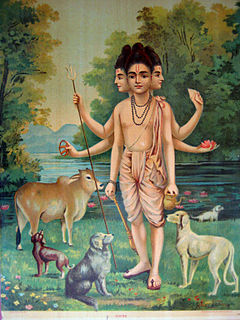 W
WThe Bhagavad Gita, often referred to as the Gita, is a 700-verse Hindu scripture that is part of the epic Mahabharata, commonly dated to the second century BCE.
 W
WBhagavata Purana also known as Śrīmad Bhāgavata Mahā-purāṇa, Śrīmad Bhāgavatam or Bhāgavata, is one of Hinduism's eighteen great Puranas (Mahapuranas). Composed in Sanskrit and available in almost all Indian languages, it promotes bhakti (devotion) to Krishna integrating themes from the Advaita (monism) philosophy of Adi Shankara, Vishishtadvaita of Ramanujacharya and Dvaita (dualism) of Madhvacharya.
 W
WThe Dattatreya Upanishad, also called the Dattatreyopanishad, is a Sanskrit text and one of the minor Upanishads of Hinduism. It is attached to the Atharvaveda, and classified as a text of the Vaishnava sect, which worships the god Vishnu.
 W
WKrishna Upanishad or Krishnopanishad is one of 108 Upanishads of Hinduism, written in Sanskrit language. It is a minor Upanishad, dedicated to the god Krishna, and belongs to the Vaishnava sect. The Krishna Upanishad is attached to the Atharvaveda.
 W
WThe Naradiya Purana or Narada Purana, are two Sanskrit texts, one of which is a major Purana of Hinduism, while the other is a minor Purana (Upapurana). Both are Vaishnavism texts, and have been a cause of confusion in Purana-related scholarship. To prevent confusion, some scholars sometimes refer to the minor Purana as Brihannaradiya Purana.
 W
WBased primarily on the earliest known written references of Abhinavaupta and Al-Biruni, academics estimate the date of origin of the Bhagavata Purana to be between 800–1000 C.E.
 W
WThe Padma Purana is one of the eighteen major Puranas, a genre of texts in Hinduism. It is an encyclopedic text, named after the lotus in which creator god Brahma appeared, and includes large sections dedicated to Vishnu, as well as significant sections on Shiva and Shakti.
 W
WThe Vishnu Purana is one of the eighteen Mahapuranas, a genre of ancient and medieval texts of Hinduism. It is an important Pancharatra text in the Vaishnavism literature corpus.
 W
WVishnu Sahasranāma, is a Sanskrit hymn which contains a list of 1,000 names of Vishnu, one of the main deities in Hinduism and the supreme God in Vaishnavism. It is one of the most sacred and popular stotras in Hinduism. The Vishnu Sahasranāma as found in the Anushasana Parva of the epic Mahabharata. It is the most popular version of the 1,000 names of Vishnu. Other versions exist in the Padma Purana, Skanda Purana and Garuda Purana. There is also a Sikh version, found in the text Sundar Gutka. Each name eulogizes one of His countless great attributes.